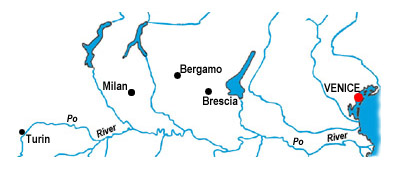Venice Acquires Brescia and Bergamo
By 1423 Milan, under the leadership of Filippo Maria Visconti, had returned to the policy of ferocious imperialism that it had pursued in the prior century. Its army was thrusting southward deep into the territory of Florence. Imola fell early in 1424 and the Florentines suffered another disastrous defeat at Zagonara. The signs for Venice were ominous, for it was clear that after satisfying his appetite to the south Visconti would likely be turning his army east into Venetian territory.
Venice was reluctant to embark on another land war, but finally in 1426 she agreed to an alliance with Florence. The decision was made easier because Francesco Bussone (known as "Carmagnola"), the most famous mercenary leader (condottiere) of the day, had recently left the service of Milan and was available to lead the forces of Venice against his former employer.

In fact, Carmagnola's leadership of the Venetians was always suspiciously lethargic, raising questions about whether he had completely severed his service to the Viscontis. Nonetheless, with a great deal of assistance from the Brescians themselves, Brescia fell to Venice in November of 1426. Late in the following year, while Visconti was distracted by hostilities with the Duke of Savoy based in Turin to the west, Carmagnola--under intense pressure from the Venetian leadership--led the Venetian forces to a major victory at Macalo. Emissaries of the Pope assisted in brokering a peace between the belligerants in April 1428. The treaty confirmed Venetian sovereignty over Brescia and granted Bergamo to it as well.
Fighting resumed in 1431, and Carmagnola's leadership became increasingly puzzling and ineffectual. Finally, in the spring of 1432 the exasperated Venetians lured Carmagnola into Venice, and then imprisoned, tried and executed him for treason. The warfare between Venice and Milan continued for more than two decades thereafter, until the Treaty of Lodi in 1454. That treaty confirmed Venetian rule at Brescia and Bergamo and introduced a surprising period of peace in the Venetian mainland.
Comments?
© 1998 C. I. Gable